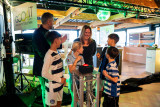Strawberry Fields creative agency has brought addressing climate change to light in a new way with an animated short film, Morgenland (Morrowland). The film takes viewers on a 12-minute positive, inspiring journey about what measures the Dutch can take to have a positive impact on reaching the European Commission’s “Climate Neutral by 2050” goal.
Contrary to many alarmist messages, Morgenland is enjoyable, understandable, and relatable to everyone. It tells a hopeful story while asking every citizen what they can personally do to help. Viewers are asked to make their own unique contributions to combating climate change.
Morgenland creates awareness and lays out the urgency of acting on climate change, however, this is done in a positive manner by spelling out what specific impacts energy transition will have on aspect of our daily lives. The film was strategically produced in an animated folk story style — something that is deeply ingrained in the Dutch culture.
Key points about reaching the 2050 goal are:
- It is necessary to reduce our energy consumption by two-thirds.
- Remaining energy usage has to be produced from sustainable sources such as wind and solar.
- It is important to close down coal-fired power plants immediately.
- Energy transition will engender innovation, and increase employment and export opportunities.
Above all, the film makes it clear that every inhabitant of this country has a role to play in the energy transition. The film concludes with a call to action: "How else can we work on our country of tomorrow?"
Strawberry Fields specializes in sustainable communication. The film and accompanying lessons for every type of education, from primary school to university, are freely accessible in Dutch and English at www.morgenlandfilm.nl.





The video offers at a sympathetic way a clear picture of the routebook towards sustainable energy/zero CO2-emission.. Only the necessity to reduce our energy consumotion with 2/3 comes out of the blue and is not elebarated either. I believe to remember (from reports of the PBL) that the 'official' forecasts opt at a final energy use of about 1800 petajoule per year in 2050 (in the Netherlands), That is about 15% less than the final energy consumption nowadays..However today we use about 3000 petajoule primary energy to produce our final energy. 1/3 of it is lost during the production process. As soon as we use only 'green' energy, these losses are much lower, albeit do not vanish all. I expect that the forecoming calculations of the PBL will offer an exact picture.